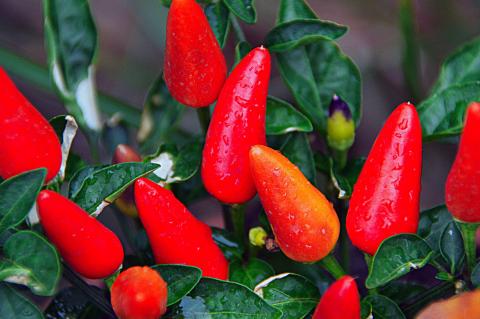What is the best way to start growing my own hot peppers?

Historically, sweet peppers have been the most popular peppers grown in the United States, but hot peppers have been rapidly gaining in popularity. Not only are hot peppers a great culinary specialty, but many varieties are also highly ornamental and make great additions to the perennial border. In warm climates peppers can be grown as shrub-like perennials, but in the northeast they are treated as annual crops. Many of the most popular hot pepper varieties take at least 75 days to reach maturity. With the short growing season in New Hampshire, successful pepper growers must either purchase transplants or start their own plants from seed indoors, because peppers that are directly sown in the garden have little chance of producing fruit before the first frost.
Seed Starting
While every garden center that sells vegetable starts is likely to offer at least a variety or two of sweet peppers, hot peppers can be much more difficult to find. Those who are truly interested in growing hot peppers are better off starting their own plants from seed in order to cultivate some interesting and unique varieties. Peppers should be started indoors eight weeks before the last frost, a couple of weeks before tomatoes and other warm season vegetables. They germinate best if the potting media is kept at 85 to 90°F, which can be achieved by placing a heat mat beneath the planting containers. Once the seeds have sprouted, the young plants should be grown under a bright light until they are ready to be transplanted into the garden.
Transplanting
Peppers will not grow well in cool, wet soils, so there’s no point in rushing to get them outside until the weather warms. Once the risk of frost has passed and the nighttime temperature stays above 50°F, they can be planted in the garden. Using black plastic mulch around peppers will enhance their growth by helping to warm the soil and suppressing weeds. Peppers are susceptible to some of the same pests and diseases as tomatoes, eggplant, and potatoes, so make sure to place them in an area of the garden where you didn’t grow any of those vegetables last year. Since peppers prefer to grow in fertile soils with a soil pH between 6.5 and 7, it’s a very good idea to get your soil tested in order to make any necessary adjustments before planting.
Choosing Varieties
Choosing which hot peppers to grow is the fun part. All hot peppers get their spiciness from a compound called capsaicin, which affects the pain receptors, not the taste buds. All peppers are rated on the Scoville scale, which is a measurement of the heat of a pepper based on its capsaicin content. While a sweet pepper has a Scoville rating of zero, habaneros rate between 100,000 and 350,000 Scoville units. Indescribably spicy peppers such as Carolina Reaper, Trinidad Moruga Scorpion, and Bhut Jolokia, the “Ghost Pepper” all have a rating of over 1 million Scoville units. Hot pepper flavor can vary a lot between varieties, so some experimentation may be necessary to learn which ones you like best.
Harvesting
Hot peppers can be picked at any color stage, but they are hottest when they are fully ripe. Mature color varies tremendously between varieties including yellow, orange, red, purple, and brown. Regardless, special care should be taken when handling hot peppers as some may burn bare skin when handled. Wear gloves when harvesting and handling, and wash hands thoroughly after. Most hot peppers are firmly attached and should be removed with a knife or clippers to avoid damaging the plant.
While growing specialty hot peppers may not be for the faint of heart (or palate), it’s a rewarding experience for those who are up for the challenge.
Got questions? The Ask UNH Extension Infoline offers practical help finding answers for your home, yard, and garden questions. Call toll free at 1-877-398-4769, Monday to Friday, 9 a.m. to 2 p.m., or e-mail us at answers@unh.edu.
Related Resource(s)
Do you love learning about stuff like this?
SUBSCRIBE TO Granite State Gardening newsletter
Got questions? The UNH Extension Yard and Garden Infoline offers practical help finding answers for your yard and garden questions.
Call toll free at 1-877-398-4769, Monday to Friday, 9 a.m. to 2 p.m., or fill out webform.
